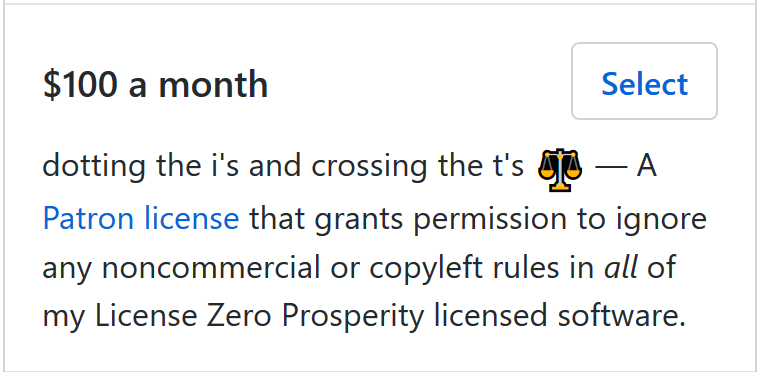dev-resources.site
for different kinds of informations.
free software actually costs something
🙌 I’m Geoff, an open software producer and maintainer. I’m responsible for authoring and maintaining tools that enable developers to deliver business value faster and easier.
Anyway I've been thinking about the topic of open-source licensing for a while now. It's clear that software actually costs something, and that even though it may be offered freely, somebody is paying the cost — I'm no longer willing to be the payor.
As such I'm switching to dual-licensing under the License Zero Prosperity Public License, the License Zero Patron License. The Prosperity License limits commercial use to a 32 day trial period, after which license fees must be paid to obtain a Patron License.
A Patron License can be obtained by making regular payments through GitHub Sponsors, in amounts qualifying for a tier of rewards that includes “patron licenses”. A Patron License grants qualifying patrons permission to ignore any noncommercial or copyleft rules in all of my License Zero Prosperity licensed software.
A License Zero Waiver may also be granted waiving the non-commercial clause of the Prosperity License without requiring a Patron License. These are granted on a case-by-case basis to friends, family, repeat contributors, folks who do good things in their community and usually when the person requesting one makes a compelling case about why the non-commercial clause shouldn’t apply to them.
Open software producers are vastly outnumbered by open software consumers. I think it's time to introduce adoption friction whilst reducing payment friction and search for the answer to this question:
Now you might be thinking - “but this isn’t actually open source”
You’re correct, at least for the “official” definition of open source. Both the Free Software Foundation and the Open Source Initiative explicitly exclude software that contains limits on use from the definition of “open source”. For this reason, the Prosperity License my projects use is not, and likely never will be, an OSI-approved license.
I think this definition of open source is in need of some reality checks. Without getting into too much detail, the open source community has a sustainability problem. As projects grow in size many maintainers burn-out or find themselves unable to satisfy increasing support and maintenance demands. Finding reliable, well-defined funding sources is extremely challenging (donations simply don’t work for the vast majority of projects) and while funding isn’t the only or exclusive way to address open source sustainability, it’s certainly one component of an overall approach. As a community if we’re going to try and improve the sustainability of the projects we rely on, and the health of their maintainers, then we have to expand the umbrella of open source to allow that maybe, just maybe, compensating maintainers for the large amount of time they dedicate to creating those projects, and placing restrictions on the use of those projects as an enforcement mechanism, isn’t such a bad idea.
For more information about these licensing changes (inc "why not use copyleft" and "this isn’t actually open source") head on over to https://ghuntley.com/licensing/
If you found this article insightful, why not buy me a cup of ☕ over at https://ghuntley.com/tipjar. GitHub will match your contribution!
Featured ones:

